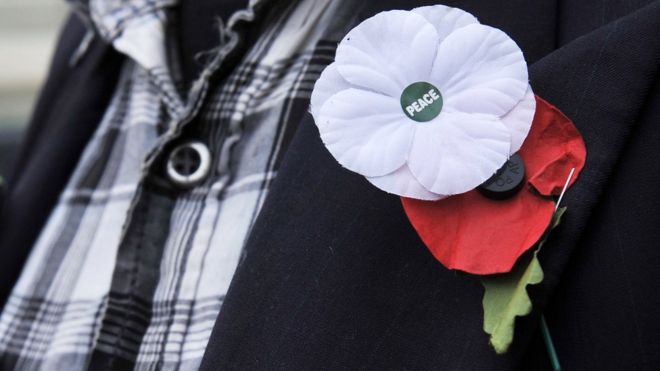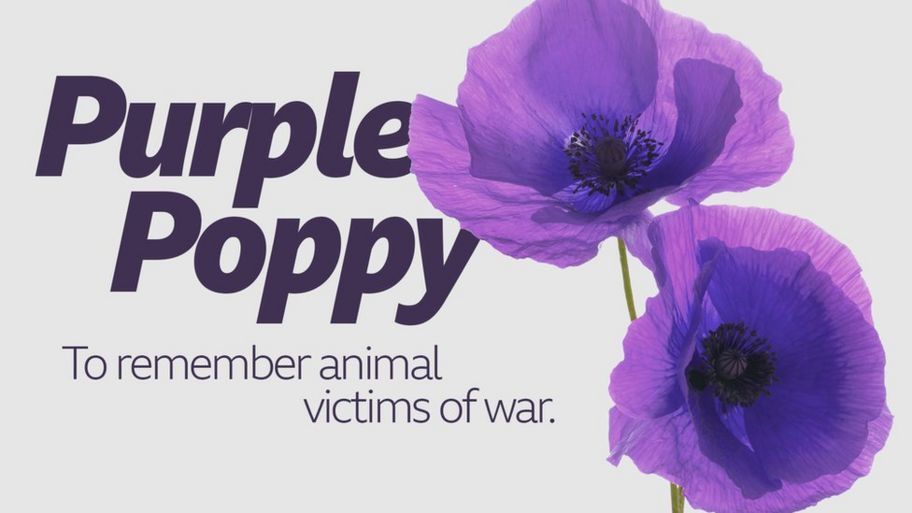Some unreconstructed thoughts on Remembrance Day:
- Poppies are great, and a really nice way of showing your respect. But only if you're actually bothering to donate to the Royal British Legion (or other relevant veterans charity) which is kind of the point. There are stories of TV news studios providing poppies for guests before interviews, and unless that guest has already donated to the RBL or intends to, it's kind of missing the point.
- People fought in WWI and WWII for people to have the rights that we enjoy today, and that includes freedom of expression. Someone may well choose not to wear a poppy. It doesn't make them a bad person, and for all you know they may have already donated to the Royal British Legion. Or they might be a war veteran themselves, who has chosen not to wear it for their own personal reasons (like WWII veteran Harry Leslie Smith). It doesn't mean they're not patriotic or respectful of war vets that have died.
- Other races and religions are not offended by the red poppy. No, they're really not. There were Indian and African soldiers that fought on the allied side in the world wars, and the British Army today is highly multicultural and multi-racial. They are not offended by poppies. That's a lie, originally cooked up by the far right to get you to try to hate Muslims and others.
I passed by plenty of people with Poppy stalls on the way into the Underground this week. Most of those people weren't white.
- Putting poppies on food packaging, or having people dress up in giant poppy costumes, is spectacularly missing the point. I happened to catch a clip or two of X Factor's Halloween week the other day, and they were all wearing poppies over the top of their Halloween costumes, and I have to say, it not only looked weird, but I would argue it was a bit disrespectful, to be honest. Halloween and Remembrance Day are tonally very different, wearing a poppy over your Mummy costume while you murder a Michael Jackson classic isn't the height of respect for the war dead.
- The size of your Poppy *really* doesn't matter. The Royal British Legion sell poppies in all shapes and sizes, from the traditional paper ones, to the larger silk versions, and to smaller pin badges. Jeremy Corbyn chose to wear a pin badge poppy today, on top of his raincoat and suit (yes, he wore a raincoat, given that it's London, in the middle of November). At his first ever cenotaph memorial as Labour leader, he also stuck around and chatted to the veterans, while the rest of Britain's current and former Prime Ministers (many of whom have continued to send off British troops into pointless wars) went off to a lavish state banquet. And Corbyn actually wants to increase *government* funding for homeless veterans, as opposed to just paying lip service to respect for soldiers.
- Plenty of people also choose to wear the white poppy, either instead of or alongside the red poppy. White poppies are not disrespectful, and they are not some new fad. They have been around since 1933, and were first distributed by the Co-operative Women's Guild. Many women wore them in honour of the husbands, brothers and sons they lost in the First World War. And in the run-up to WWII, many women wore them in protest against the march to war when politicians had promised them the previous war would've been the 'War To End All Wars'.
We can argue about the wisdom of that at the time, given that attempts to find a peaceful solution to Hitler's imperial tendencies demonstrably didn't work, but the point is, the white poppy is to symbolise a commitment to peace. The Peace Pledge Union distribute them today, and the aim is to remember victims (both servicemen and women) and civilians of war, and to continue to work towards peace. You can wear a white poppy or red poppy, or both, as many do, and you are not necessarily depriving money that would otherwise go to veterans. You can wear a white poppy *and* donate to the Royal British Legion or other veterans' charities.
We can argue about the wisdom of that at the time, given that attempts to find a peaceful solution to Hitler's imperial tendencies demonstrably didn't work, but the point is, the white poppy is to symbolise a commitment to peace. The Peace Pledge Union distribute them today, and the aim is to remember victims (both servicemen and women) and civilians of war, and to continue to work towards peace. You can wear a white poppy or red poppy, or both, as many do, and you are not necessarily depriving money that would otherwise go to veterans. You can wear a white poppy *and* donate to the Royal British Legion or other veterans' charities.
- Having said that, the Peace Pledge Union also believe that really, war veterans should not have to rely on charity, and that the government should be the ones providing healthcare, medical care, therapy, a safe home etc., to veterans. There are thousands of homeless war veterans, and it shouldn't just be the job of the Royal British Legion to help them in their hour of need. Our government ought to be the main ones looking after them, given that they are the ones who sent them off to war in the first place.
- People also wear Purple Poppies, to commemorate the animals who have been used and fought with in war. That's perfectly legitimate and respectful too. Again, just because someone might wear a purple poppy instead of a red one, doesn't mean that they haven't donated to the Royal British Legion in private - again, the donation to the RBL (or other veterans charity) is the point.
- We shouldn't glorify war. The whole point of the poppy - the original point of Remembrance Day - was to not only remember those we have lost, but to resolve to avoid conflict and war in future. Almost every war and conflict starts with the failure of dialogue and descent into violence, and ends in a political agreement. It would be great if we could cut out the middle part, of so much death and destruction, and tried, wherever possible, to find a peaceful solution. War should be a last resort, not a first response.
- WWII in particular largely began with fear and loathing of the unlike, and the different. It came with not only providing simple solutions to complex problems, but with the simple solution often being to blame the other. The immigrant, the Jew, the gypsy, the disabled. Leaders also targeted people for their political beliefs - socialists, social democrats, communists. They would demonise the free press, and call them 'enemies of the people'.
Make sure that we don't let the same thing happen today, and that we don't let it happen in Britain. Don't blame Muslims, don't blame Jews, don't indulge in conspiracy theories or stereotypes about either, because they are dangerous. Be a citizen of the world as well as a citizen of this country. Look after and respect minorities, and champion liberty, and freedoms. That is and will be the most fitting tribute to those who fought and died to protect those rights.







No comments:
Post a Comment